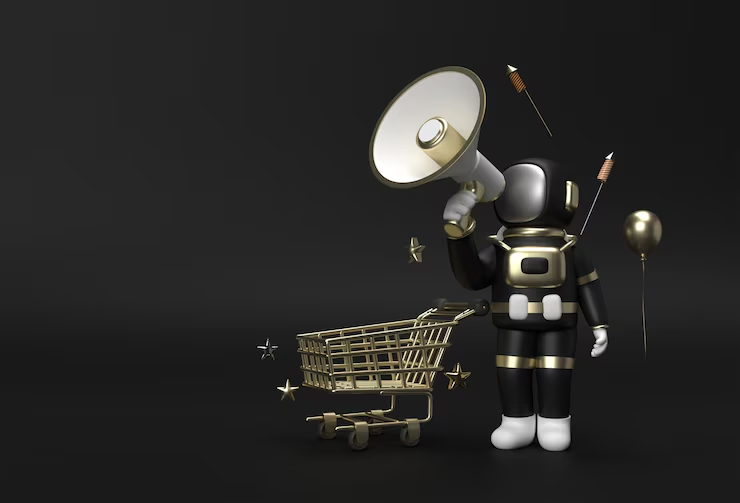Examples of AI in Digital Marketing

Artificial Intelligence (AI) is revolutionizing digital marketing by streamlining operations, enhancing personalization, and driving smarter decision-making. From targeted advertising to real-time customer support, AI tools are empowering brands to connect with audiences more efficiently than ever. In this article, we’ll dive into impactful Examples of AI in Digital Marketing, showcasing how businesses are leveraging AI across SEO, social media, CRM, e-commerce, and beyond to boost performance and stay competitive.
Introduction to AI in Marketing
AI is transforming marketing by removing guesswork and enabling smarter, data-driven strategies. For a digital marketing agency in Dubai, this shift is crucial to staying competitive. AI tools help analyze customer behavior, automate personalized communication, and even forecast future buying trends with impressive accuracy. Whether you’re exploring CRM automation or enhancing content creation, AI opens up a world of possibilities.
Platforms like ChatGPT, predictive analytics, and AI-powered ad systems allow marketers to optimize campaigns, reduce costs, and deliver more relevant, engaging experiences. By using Artificial Intelligence in Digital Marketing, businesses can make informed decisions, boost ROI, and build stronger connections with their audience. The ability to process vast amounts of data in real-time gives companies a distinct advantage in today’s fast-paced digital landscape. As AI continues to evolve, agencies that embrace it will be better equipped to drive innovation, stay agile, and meet ever-changing customer expectations with precision and creativity.
Examples of AI in Digital Marketing
Artificial Intelligence is no longer a futuristic concept, it’s already transforming how businesses approach marketing. From streamlining operations to enhancing customer experiences, AI is being used in practical, impactful ways. In digital marketing, AI plays a key role in automating repetitive tasks, analyzing large sets of data, and delivering personalized content to the right audience at the right time. For digital marketing agencies, especially in competitive markets like Dubai, AI is a game-changer.
It helps improve targeting, boost campaign performance, and increase ROI. Whether it’s through AI-powered chatbots, automated email marketing, or predictive customer analytics, the applications are endless. By using AI-driven tools, marketers can gain deeper insights, make faster decisions, and stay ahead of trends. The following are real-world examples of AI in digital marketing that demonstrate its power to reshape strategies, drive growth, and deliver measurable results across multiple platforms and customer touchpoints.
1. AI-Powered Audience Segmentation
Traditional segmentation based on demographics is no longer enough. AI allows marketers to segment audiences based on behavior, engagement, interests, and even predicted future actions. By analyzing customer interactions across channels, AI creates dynamic customer profiles. Brands can then deliver personalized experiences to different segments, improving engagement and conversion rates. This goes beyond automation, it’s hyper-targeted marketing.
2. Predictive Lead Scoring
With predictive analytics, AI can score leads based on the likelihood of conversion. Instead of relying on manual scoring or basic criteria, machine learning models analyze data such as time on site, email engagement, and past purchase history to assign scores. This helps sales and marketing teams focus on high-quality leads and close deals faster. It streamlines workflows and reduces wasted time.
3. Chatbot-Driven Lead Generation
AI-powered chatbots are now capable of more than just answering FAQs. They actively guide visitors through websites, collect information, and even qualify leads in real time. For instance, a user who browses a product page may be prompted by a chatbot offering a discount or suggesting a personalized option. These bots operate 24/7, ensuring you never miss a potential customer.
4. AI Social Media Examples
Social media is one of the most powerful areas where Artificial Intelligence is making a significant impact. From optimizing content to refining audience targeting, AI is helping brands enhance their social media strategies like never before. Platforms now use AI to analyze user behavior, predict engagement patterns, and even recommend the best times to post. For marketers, this means better reach, higher engagement, and more efficient campaign performance.
AI also plays a key role in social listening, sentiment analysis, and trend prediction, allowing brands to stay relevant and respond quickly to audience needs. Tools powered by AI can generate captions, suggest hashtags, and even automate customer responses through intelligent chatbots. Whether you’re managing a single account or running multiple campaigns, AI helps streamline workflows and improve results. The following AI social media examples highlight how technology is transforming the way brands connect, communicate, and grow their presence across digital platforms.
5. AI-Generated Social Content
Tools like Jasper and Lately use AI to create high-performing social media captions, post ideas, and even hashtags based on previous engagement. These tools analyze your brand voice and past content to generate consistent, engaging posts. This allows marketers to maintain a regular posting schedule without spending hours writing content manually.
6. Smart Ad Placement and Targeting
Platforms like Facebook and Instagram use AI to optimize ad placement. Meta’s Advantage+ campaigns use machine learning to determine which ad creative, format, and audience will perform best. This results in better ROI and less manual testing. It’s one of the clearest artificial intelligence in digital marketing examples in everyday use.
7. Chatbot Engagement on Social Media
On Facebook Messenger and Instagram, AI chatbots can engage users in personalized conversations. From answering questions to guiding users to specific products, bots are improving customer experience and increasing conversions. With natural language processing (NLP), they now handle complex queries more effectively than ever.
AI Marketing Automation and CRM
CRM systems are smarter today thanks to AI. They can track user behavior, schedule communications, and even predict which users are about to churn. This automation ensures that your marketing messages reach the right person at the right time.
With tools like HubSpot and Salesforce Einstein, marketers get recommendations on when to follow up, what kind of content to send, and how to convert leads. AI-powered CRM consultation can transform your workflow, helping you nurture leads through the funnel. For businesses seeking scalability, combining AI with CRM automation tools is one of the best investments they can make.
AI Digital Advertising Examples
Artificial Intelligence is transforming digital advertising by making campaigns smarter, faster, and more cost-effective. Below are key examples of how AI is reshaping performance marketing across platforms and industries.
1. Programmatic Advertising
Programmatic advertising uses AI to automate the process of buying and placing ads in real time. Instead of relying on manual negotiations or fixed media buying, AI-powered platforms analyze user data, such as browsing behavior, location, device, and interests, to instantly decide which ad to show, to whom, and when. This ensures your ads reach the most relevant audience at the optimal moment, improving engagement and return on ad spend.
Popular platforms like Google Display Network and The Trade Desk use programmatic systems to manage billions of real-time auctions per day, allowing advertisers to scale quickly and efficiently.
2. Dynamic Creative Optimization (DCO)
Dynamic Creative Optimization takes personalization to a new level. This AI technology automatically tests and tailors different combinations of ad elements, including headlines, images, videos, and calls-to-action, for each individual viewer.
Based on audience data and performance metrics, DCO algorithms serve the version of the ad most likely to perform best for each user. For example, a user who frequently shops for sportswear may be shown an ad with athletic images and performance-driven copy, while another user interested in fashion sees a stylish, trend-focused version of the same campaign. This leads to higher click-through rates, stronger engagement, and better conversions without manual A/B testing.
3. AI-Powered Budget Allocation
AI doesn’t just improve ad targeting, it also helps you manage your advertising budget more effectively. Tools like Google Ads’ Smart Bidding and Facebook Ads’ automated budget optimization use machine learning to adjust bids and reallocate budget in real time based on performance data.
These systems consider hundreds of signals, such as time of day, user behavior, device type, and conversion likelihood, to decide where and how much to spend at any given moment. The result is higher efficiency, less wasted budget, and maximized ROI, especially for performance-driven campaigns.
4. Predictive Analytics for Audience Targeting
AI enables advertisers to go beyond reactive marketing by using predictive analytics. This involves analyzing historical data to forecast which audience segments are most likely to convert.
Platforms powered by AI can identify patterns in customer behavior, like abandoned carts, browsing habits, and previous purchases, and use this information to create lookalike audiences or refine targeting strategies. Predictive models can even suggest the best time to run your ads or what message will likely drive conversions, giving your campaign a competitive edge.
5. Chatbots and Conversational Ads
AI-powered chatbots and conversational advertising formats allow brands to interact with customers in real time. These ads simulate human-like conversations within the ad unit itself, offering product recommendations, collecting lead information, or assisting with customer queries.
Used across social platforms like Facebook Messenger, WhatsApp, and display ads, these interactive formats not only boost engagement but also shorten the path to conversion by giving users instant answers and personalized suggestions.
AI for E-Commerce in the UAE
In e-commerce, AI is essential for providing personalized shopping experiences. One of the most familiar artificial intelligence in digital marketing examples is the use of recommendation engines. These systems analyze user behavior and suggest products accordingly, boosting sales and customer satisfaction.
AI is also used for predictive inventory management. By analyzing sales trends and customer behavior, AI can help forecast demand and optimize stock levels. This reduces overstock and understock issues.
Visual search is another emerging tool. Customers can upload an image, and the AI will find similar products. This makes the shopping experience faster, smoother, and more interactive.
AI in Customer Service and Chat Support
AI chat support has evolved to be more human-like and efficient. Tools like Zendesk, Intercom, and Drift provide AI-driven customer support across websites and apps.
24/7 availability is one of the major benefits. Chatbots respond instantly to customer queries, improving satisfaction and reducing workload on human agents.
AI also performs sentiment analysis. By analyzing words and tone, it determines the customer’s mood and tailors responses accordingly.
When necessary, AI can escalate the issue to a human agent, ensuring complex problems are resolved quickly. These Examples of AI in Digital Marketing not only save time but enhance customer experience dramatically.
AI in Search Engine Optimization (SEO)
Search engines like Google now rely heavily on AI to deliver results. As a result, marketers must adapt their SEO strategies accordingly.
Content optimization tools like Clearscope and Surfer SEO use AI to suggest the best keywords, topics, and structure to improve rankings. These tools analyze top-ranking pages and provide data-backed recommendations.
Voice search optimization is another area. With the rise of smart assistants, AI helps marketers understand how people phrase queries differently in speech versus typing. Optimizing for voice is no longer optional.
AI-driven keyword research tools offer smarter suggestions by identifying long-tail keywords and search trends. These insights power better AI SEO services that align content with user intent.
Use AI to Elevate Your Digital Marketing Activities
Integrating AI into your marketing doesn’t mean replacing your team, it means empowering them. AI can take care of repetitive tasks like scheduling, reporting, and testing, so your team can focus on strategy and creativity.
Start by identifying areas where AI can make the biggest impact, such as ad targeting, CRM automation, or SEO optimization. Evaluate tools based on your specific needs and invest in platforms that align with your goals.
Keep in mind that AI is most effective when combined with human insight. A tool can analyze data, but it takes a marketer to interpret it and make impactful decisions.
How AI Has Revolutionized Marketing
AI has created a fundamental shift in how marketing is done. It’s no longer about intuition, it’s about intelligent decisions powered by data.
Data-Driven Decision Making
AI processes massive amounts of data to uncover patterns, trends, and insights that human analysts might miss. With real-time dashboards and predictive modeling, marketers can make smarter decisions faster.
Personalized Customer Experience
AI enables hyper-personalization at scale. From product recommendations to personalized emails, users receive content that matches their interests and behavior. This leads to better engagement and loyalty.
Process Automation & Scale
AI automates tasks like lead nurturing, content scheduling, and performance analysis. This reduces human workload and allows businesses to scale without increasing costs.
Will AI Take Over Digital Marketing?
AI won’t replace marketers, it will make them more effective. While AI can analyze data and automate tasks, creativity, empathy, and strategy remain human strengths. Instead of fearing AI, marketers should embrace it as a partner.
The future of digital marketing will be a hybrid of AI and human expertise. Marketers who adapt will be better equipped to deliver personalized, efficient, and effective campaigns. Those who resist risk falling behind.
Ready to Transform Your Marketing with AI? Let digializer Lead the Way in Dubai
At Digializer, we don’t just keep up with AI marketing trends, we set them. As a performance-focused digital solutions partner, we specialize in helping businesses harness the power of artificial intelligence to scale smarter, market faster, and convert better.
Whether you’re a startup aiming for growth or an established company looking to modernize your marketing stack, Digializer brings unmatched expertise, real strategic thinking, and cutting-edge AI tools to the table.
Real Partnership, Not Just Tech Support
You’re not just another project on a list. We become an extension of your team, offering ongoing strategic support, performance optimization, and transparent insights every step of the way.
Contact us today to explore how AI marketing can transform your business, and why Digializer is the team to make it happen.
FAQ
How SmartOSC Helps You Apply AI in Marketing Examples
SmartOSC integrates AI into marketing ecosystems through automation, predictive analytics, and customer personalization. Their solutions help businesses scale digital campaigns effectively and improve ROI.
How does Netflix use AI for marketing?
Netflix uses AI to analyze viewing behavior and personalize recommendations. It also uses machine learning to optimize thumbnails, target ads, and schedule content drops based on user preferences.
How does Coca-Cola use AI in marketing?
Coca-Cola uses AI for product innovation, customer sentiment analysis, and personalized advertising. Their AI tools analyze consumer feedback and social media conversations to refine marketing strategies.
Which AI tool is best for digital marketing?
The best AI tool depends on your goals. Jasper is great for content, Surfer SEO for optimization, and HubSpot for CRM. Most businesses benefit from combining multiple tools.
What type of AI is used in marketing?
Marketing uses machine learning, natural language processing (NLP), predictive analytics, and computer vision. These technologies help with targeting, personalization, automation, and analysis.
Is ChatGPT the best AI?
ChatGPT is one of the most advanced conversational AIs available. It’s excellent for content creation, customer support, and brainstorming. However, the best AI depends on your specific marketing needs.






